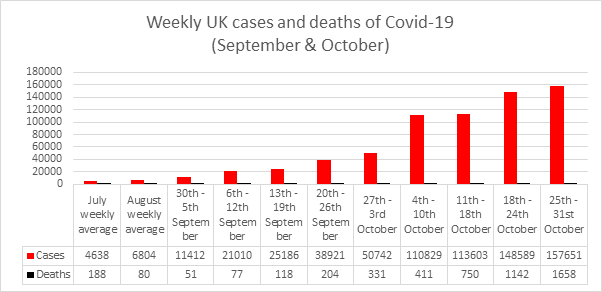This is the thirty-second of a series of bulletins produced by ISE to update members on key data and policy on Covid-19. This covers the period 29/10/2020-04/11/2020.
You can access all of the Covid-19 bulletins on ISE insights.
Latest Covid-19 data

Data taken from Wikipedia and from the government’s Covid-19 dashboard.
The UK has now had a total of 1,099,059 identified Covid-19 cases and 60,051 deaths (with Covid on the death certificate). The R rate is estimated to be between 1.1 and 1.3 with the daily infection rate growing by 2-4%. This means that the UK’s second wave is continuing and accelerating. The number of cases has continued to increase and the pattern of the number of deaths doubling every two weeks has been maintained.
Lockdown policy
- England enters a new phase of national lockdown from 5th November.
- Devi Sridhar discusses the intertwined science and politics of lockdown.
- Scientists at the University of Warwick have demonstrated that the Eat Out to Help Out scheme had a causal impact on the spread of Covid.
Education
- Many schools are having to regularly send pupils home due to Covid outbreaks. Research demonstrates that it is the pupils in the poorest areas who are missing the most schooling.
- The move into a new phase of lockdown raises questions about how the exams will be managed in schools in 2021 with concerns that a reliance on the mocks will disadvantage some students.
- The approaching Christmas holidays require a national approach to dealing with Covid in the student population. Union leaders continue to raise concerns about face-to-face teaching in universities.
- There has been very unequal access to adult learning during lockdown with those who are most likely to benefit least likely to take part.
- Debate continues about England’s careers system, with Tristram Hooley and others calling for changes to the National Careers Service funding system. Meanwhile, Oli de Botton has been named as the new Chief Executive of The Careers & Enterprise Company.
The economy
- The economic prospects for the UK look fairly bleak due to the pandemic, recession and Brexit. There are concerns that the second lockdown will result in a shrinking economy.
- Discussion about the right economic response to Covid-19 continues. Disruption can drive economic changes, but there are concerns as to whether the UK’s current economic strategy is making the most of these changes. The IMF suggests that the UK needs to boost public spending during the pandemic. Some MPs are calling for a trial of Universal Basic Income. While economist Grace Blakely argues for even more radical economic and political solutions to the ‘corona crash’.
- The pandemic is likely to reduce the possibility of social mobility.
The labour market
- The number of vacancies advertised each week continued to grow during October but have not reached pre-pandemic levels.
- The number of redundancies rose again in September. Many anticipate that the number of unemployed people including those who are long-term unemployed will continue to rise.
- The government have announced an extension to the furlough arrangements in line with the new lockdown.
- The pandemic is likely to change the skills that employers need.
- Workers who have returned to their workplaces still face a range of safety issues.
The student labour market
- There is a need for an increased policy focus on youth unemployment.
- Graduates are struggling to find jobs in the current labour market with many applying for tens of jobs before being successful. There is a need for greater support for this year’s cohort of school and university leavers. Prospects have produced new guidance for students on job hunting in a pandemic.
- New research published on the careers of performing arts graduates from CRAC and ISE. Tristram Hooley and Robin Mellors-Bourne blog on ISE: Insights to explain why these graduates felt it helps to have more strings to your bow.
Student recruitment and development
- Employers are likely to have to manage higher levels of applications during the pandemic.
- Young jobseekers reveal what they want from recruitment. This is also explored in the ISE’s latest podcast.
- It is important for employers to continue to attend to diversity during the pandemic. But this needs to recognise that the transition from university to the workplace is a complex process.
- Student unions are an untapped resource for graduate recruiters.
- Employers need to support new hired who begin work remotely.
Working under Covid
- Debates continue as to what the impact of homeworking has been on productivity. The rise of remote work has also brought increased digital surveillance of employees.
- It is important to look after your mental health during lockdown. There are a range of well-evidenced strategies that you can use to do this.
Employer insights
Insights gathered from ISE employer ‘town halls’ and other interactions over the last week.
- Employers are reporting that it can be difficult to make contact with students, particularly after they have left education. Firms are trying a range of virtual approaches with mixed success due to student engagement and tech problems. Platforms where students can schedule meetings at last minute work much better.
- There is a big upsurge in applications. This is probably because of the weak labour market rather than because of anything that firms are doing in terms of attraction.
- Firms are planning for virtual internships during 2021 with limited time in the office.
- The retail sector has been badly impacted by the pandemic. Some elements of it (e.g. hospitality) more so than others. The second lockdown is going to exacerbate this both because it is requiring some retailers to shut and because it is requiring investment in new business processes to change the way that services are delivered. All of these factors make it less likely for employers in the sector to recruit. Some employers have suspended their recruitment.


0 Comments